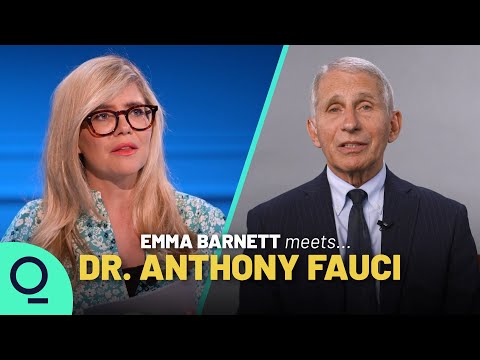Dr. Fauci on the Politicization of Public Health | Emma Barnett Meets

So who's my guest this week? It's the Chief Medical Advisor to the U.S. President, Dr. Anthony Fauci. From death threats to Fauci fever. If you become one of the biggest figures of the coronavirus pandemic, you're going to elicit a reaction.
As a member of the White House COVID Task Force under President Trump, Dr. Fauci became the face of the U.S. scientific response. As the crisis continued, science and politics clashed. His attempts to understand the virus and save lives were welcomed by many, but derided as authoritarian by others. Some of his advice led to chants of fire Fauci, a slogan that was retweeted by his boss in the Oval Office, but he kept his job. He says letting the science speak got him into a little bit of trouble.
So how does he see things now as the wave of the pandemic retreats and with a new president in the White House? Here's what's coming up. I chose this and I accept the risks, but my family, my wife and my children continually get hassled and threatened by things that are really unimaginable. Are you relieved you don't have President Trump in that position anymore? Back then it made it very uncomfortable for me because I had to frankly disagree publicly with the president of the United States.
Dr. Fauci, thank you so much for joining me. And I have to say, I feel like I know you because I have seen your face so much even here in the UK over the last couple of years. How has it been for you becoming so much of a household name? Well, I don't really think of it at all as being a household name, more so that we have to get the correct evolving, scientific information out.
And that, since it's such a moving target, that really necessitates, you know, rather frequent updating of what the status is, both from a public health as well as from a scientific standpoint. So it's really a very unique situation that I and some of my colleagues find ourselves in, is that it's not static. And when you have an event that occurs and you brief either domestically or internationally and generally things don't change, you don't see very much of a person, but when you have a very fluid dynamic situation that we have right now, that really creates an unprecedented situation where I have become very well-known merely because of the need to continually update and brief at both a domestic and international level. I mean, to that point and I totally take that point because of the nature of the situation. I imagine at times it's been frightening, you know, how much it's been changing and the reality on people's lives. You know, you must have felt enormous pressure.
And I imagine you're also receiving a lot of emails from people. A lot of people asking you what was going on. Are you able to look back at that now and kind of take that in? No, I still can't take it in because it's completely transformed my life in so many ways and, you know, positive ways and negative ways because of the charged nature and the stress that this outbreak has put on my own country and throughout the world, superimposed upon the divisive political nature in my own country. There has been really a great deal of divisiveness and even rancor among people so that you have people who look to you. Many, many people and I think the majority that look to the science look to me as someone who is communicating the science and the public health in a way that's positive and productive cause they wanna know what's best for themselves and their family and their community. And yet there are some, you know, who really are swept up in conspiracy theories and distortions of reality and anti-science untruths that create a hostility towards me and the scientific community in general that really as unprecedented, we've never seen anything like that where the only thing that I've ever expressed, everything that I've ever communicated has been based on the reality and the evidence as we know it.
And it does change the evidence because there are things that we know now, we're dealing with a virus that continues to fool us. It continues to move. It continues to evolve. It continues to create new variants. In your country, what do you attribute that to, that lack of trust amongst some? Well, it's become the politicization of what should be a purely public health issue. The idea that we have in our country, the level of acceptance of well-proven public health interventions such as vaccines, which have clearly been shown to be lifesaving, to be highly effective and very safe, and very often, it's along ideologic lines when it should be.
There should be no ideological differences in interpretation of what our core, immutable public health principles. And yet the pushback that we have against seemingly obvious and scientifically proven public health principles is extraordinary. And the degree of rancor is such that I never would've imagined in my wildest dreams that anything that I've ever said which is purely public health and non-political and non-ideologic leads to continual death threats against me to the point where I have to be surrounded by federal agents for my protection all the time. I mean, that seems inconceivable. If you turn back the clock and talk about other public health crises that we've had with polio and with measles and with smallpox and the things that we've had to alert the public to, there's never been a situation where the divisiveness have led to the threat of physical harm. That is as unprecedented as the notoriety that I have regarding the purely communication of public health principles.
How did you cope with that? How have you coped with having death threats? I mean, are you scared? What about your family as well? Well, you know, I mean, I have a job and I've devoted myself to my job. I've been at the NIH now for more than 50 years and I've been the director of the Institute, the National Institute of Allergy and Infectious Diseases for 38 years and I've served and advised seven presidents, going all the way back to Ronald Reagan. So this is my job. I understand it.
And this is the life that I've chosen. I never would've imagined that it would be beset with the kinds of rancor and threats. So I don't like it. My family, I think, is the one that I feel more concerned about because I chose this and I accept the risks, but my family, my wife and my children continually get hassled and threatened by things that are really unimaginable.
I mean, obscene phone calls and threats and knowing their addresses and knowing where they work and knowing what they do and to continually hassling them. That is just absolutely preposterous that that goes on in societies. I'm very sorry to hear that. You know, I really am because, of course, what you're doing at the same time, you know, you're trying to save lives and yet you're receiving death threats.
I understand it's different to what has been before, but who do you blame for that? You know, I don't think that one can just pick out a person or a movement to blame, but what we do have is something that's very disturbing in this country, is what I refer to as the normalization of untruths. There's so much distortion of reality and conspiracy theories that are spread widely by social media, where you know, social media can have a positive impact on society by spreading important productive information. But when you get total untruths and quite frankly, lies and absolute crazy distortions of reality that get picked up, spread through the social media, and then certain elements in our own political system utilize that to distort reality. And it just compounds the divisiveness in the country. When you talk about elements in the political society, obviously I was looking back at your time and what was said certainly under the previous president, President Trump, and reminding myself of the time he suggested injecting disinfectant to clean COVID out of the body. Are you relieved you don't have President Trump in that position anymore? Back then it made it very uncomfortable for me because in order to maintain my own integrity as well as to fulfill my responsibility to the American public, I had to frankly disagree publicly with the president of the United States.
And that is a very difficult thing to do. I did not enjoy that, but that created a backlash against me by people who were staunchly loyal to the president. Can I ask about the America, whether it's, the U.S.,
whether it's out of the pandemic phase of COVID, where are you at with that? Well, you know, I think that leads to confusion because understandably you would not expect the general public to appreciate all the different nuances. If you talk about the explosive phase of a pandemic where you have no countermeasures, you have no vaccines, you have no drugs. I mean, thankfully, the number of deaths and hospitalizations as a ratio compared to the number of cases is much lower.
We're having considerable number of cases now in the U.S. as we get new and new, more variants as they evolve. The deaths are still at a high level, 300 a day, but it's not the 3,000 a day that we were having several months ago.
So, you know, everything is relative. Are we still in a pandemic? Absolutely, we are. Are we in that very fulminant stage that we were in last year? No, and hopefully, the more people that get vaccinated and boosted and the more people who realize the importance of when you have a high level of viral dynamics, that when you're in an indoor setting, you should wear a mask, even though the whole world including the United States and the UK are just worn out and tired by this outbreak.
It isn't over yet. People need to realize it is never gonna go back to zero. That's not the nature of this virus. What do you make of those who talk about the fact that now the media aren't doing those daily counts and it isn't being covered, if you like, in the same way that, you know, it was never as bad as it seemed, if you see what you mean.
So that's not talking about people who are conspiracy theorists. I'm talking about those who say it was hyped and being hyped and fear was being stoked by having that level of coverage. Well, first of all, to say it was hyped is just completely contradicted by the terrible burden that the entire world, including the UK and certainly the United States, we have over 1 million deaths in the United States from this outbreak.
That's not hype. That's very painful, stark reality. So anybody says that this has been hyped up is just not looking at what's going on in the world and certainly not in the United States. And the other part of this, part of COVID is long COVID as well.
People living with the effects of it. And I wonder, Dr. Fauci, what was your take on that? How you would actually define it 'cause there's debates going on about how it should be treated as a physical issue, a psychological issue, as both. What would you say? Well, certainly, it's a real phenomenon. I mean, there's always psychological stress associated with disease, but I think if you put that aside for a moment, the idea that there's a certain percentage of people and it really varies, you know, from a few percent, 5% up to 20 or more percent, of individuals who when they get COVID and apparently recover from the acute phase of it and they are no longer viral positive, if you wanna use that terminology, that they have the lingering of symptoms that are not fully explainable by any yet identifiable pathogenic process.
We're working very hard to try and figure out what it is, but the symptom complex has some degree of consistency. The most dominating one is profound fatigue upon minimal exertion. Something that would not fatigue you at all in your prior pre-COVID condition.
People are totally exhausted. Sometimes, they have very strange things like sleep disturbances, like the dysregulation of body temperatures. And some of them have a very strange unexplainable difficulty in focusing or concentrating, which is referred to as brain fog. Well, it sounds hellish.
It sounds awful. Oh, it is. It is and it's real.
And that's one of the reasons why we are concerned about that and why we're investigating it so intensively. So long COVID is something we need to take seriously until we find out exactly what it is. And quite frankly, you have to be perfectly honest to admit it is unclear exactly what the mechanism of this particular condition is. If I may just take you to another area of concern at the moment, while I have some time with you, there is a lot of concern about monkeypox. And I wonder what your level of worry about that is with regards to America or what you can say about the current thinking on monkeypox. Well, I mean, obviously in a world, a global community that's been beset with COVID for two and a half years and you have yet, again, another disease that is now afflicting people, you've gotta make sure that A, you don't underplay it and just brush it aside nor create panic.
There are some significant differences here because we've known about monkeypox for a very long period of time. It's been endemic in certain countries, particularly in Central and West Africa for some time. By introducing it into the human population in non-endemic areas and it looks like, at least from an epidemiological standpoint, that there's a heavy predominance among the gay community, gay men, men who have sex with men because of the close personal contact that one has. It's not necessarily in the true sense and we don't know that, but it's not necessarily in the true sense sexually transmitted but it appears to be transmitted among sexual partners in the gay men who have sex with men population. I mean, the UNAIDS agency said at the end of May that monkeypox, regarding monkeypox, racist and homophobic rhetoric risks stigmatizing the disease and undermining the response. Dr. Fauci, of course, you built your career
during the AIDS crisis. You'll be very familiar with the risk around stigmatization. And of course, lessons being learned from COVID, we hope. What is your concern or response to that? Well, I absolutely believe we've gotta put aside stigma. There should be no stigmatization associated with any subgroup of a population that has a disease. So we've gotta strike the delicate balance of making sure the people who we see with the evidence appear to be those.
If you look at a group of 2015 people, the majority of them at least in the United States are men who have sex with men. That should not be a stigmatization, but that should be a clue to help us to figure out what's going on right now. So we've gotta balance doing the right thing to alert the appropriate populations and subgroups, at the same time as we don't stigmatize them because stigma is the enemy of good public health practices. We've gotta stay away from that and do what's right for people who are at risk for this infection. I suppose it's just, again, in the era of social media and how people like yourself, public officials like you can try and get through when we talked about that atmosphere that that information lives in now.
Yeah, I mean, social media, again, is something that, as I've said so many times in in other settings, there's a good positive aspect of it that you can get good information circulated rapidly and widely, but it is also a great danger when you get things that are put into the social media sphere and you wind up spreading not only stigma and prejudice, but also counterproductive information. So we've gotta be very careful. Would you say social media companies having allowed that to happen in certain instances pose a public health issue? You know, I get asked that question often. I am not very well-tuned into what can and cannot be done in regulating disinformation and misinformation. That's not my lane.
And I've learned now after many years of experience, don't make proclamations in areas that are not my area of expertise. So I'm not sure what the best way to control that. There is one productive way to do it, is to try and counter misinformation and disinformation by getting out there and proactively putting out correct, scientifically-based, and sound correct information. Well, I mean, I'm also just minded to bring up the fact that you've called gun violence in America a public health issue. Of course, the debate about that rages both off and online as well.
And I wonder, is that cutting through? Do you think it is finally cutting through in any way in America? Can you see the political divide closing any time soon? The political divide closing? No, I see as we approach a very important election in the United States that the political divide is gonna get even more intense. You know, one would hope and I do hope as a physician, a scientist, and a public health official, that when you're facing a common enemy, that that's the time for a country to pull together. You know, the way you pull together after the anthrax attack on our country.
The way you pull together after a natural disaster. The way the UK pulled together during World War II. And the way we ourselves pulled together during conflicts. But unfortunately, we're not seeing that.
We're seeing just the opposite. We're seeing what should be something that brings a nation together, is something that's actually, unfortunately and paradoxically having the opposite effect of splitting us up even more. The other disease as it were, was Fauci fever, I'm told, that swept the country. Well, your face has been, I've been told also, on things like donuts, all sorts. What's the weirdest thing you've seen your face on? And have you been bought any of the merchandise? No, I have not.
I've been given some of the merchandise. I certainly have not bought it. Well, have you got a mug, T-shirt? Well, you know, these candles that come out are kind of the more extraordinary. I mean, I can't imagine I have my face on a candle. That's really way out there. That's way out.
And Brad Pitt apparently played you on "Saturday Night Live". Yeah, I know. You know, most people don't really appreciate that.
I can't really pay attention to that because I cannot be distracted No, I know, I know. from what I do on a daily basis. But if you had to pick someone to play you, that's a pretty good one, right? Well, you know, I said that offhand, jokingly. I didn't even know you said that. when a reporter asked me,
he said, would you like to have Ben Stiller or Brad Pitt play you? And of course I said, Brad Pitt, you know. Everybody who's a male wishes they looked like Brad Pitt, which I certainly don't. Well, Dr. Fauci, we watched it so you didn't have to, you know? You were too busy trying to get that information across. Thank you very much for sparing the time today. It's been good to talk to you.
My pleasure, good to be with you. Thank you for having me. Thank you. And thank you for being with us, too. Until we meet again, take care and goodbye.
2022-06-19 08:53


